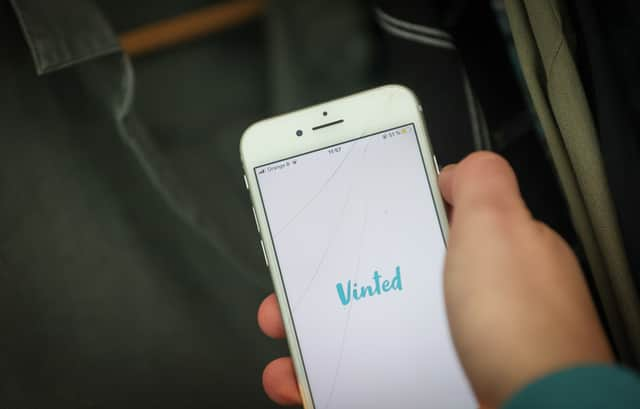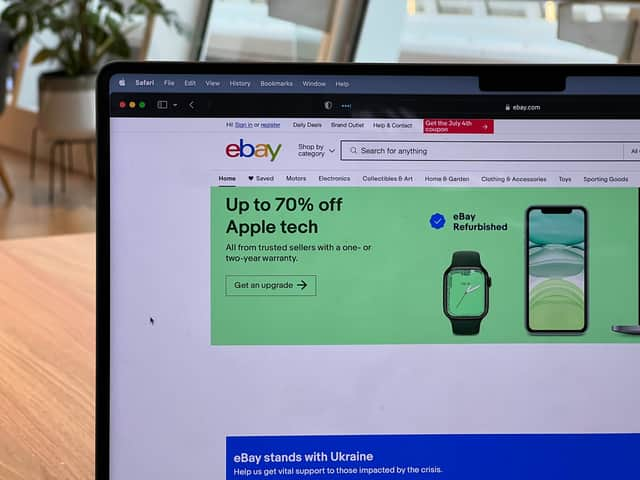HMRC side hustle tax UK: OECD crackdown on Depop, eBay, Vinted & Etsy explained


HMRC has confirmed a 'crackdown' on popular digital platforms such as eBay, Depop, Vinted and Etsy to identify 'side-hustle' sellers who are making a profitable income and not paying tax. Under new rules, the second-hand platforms are obligated to collect and share data with tax authorities as part of an effort to stop tax dodgers.
With the cost of living crisis an ongoing concern in the UK, more than ever before people are increasingly looking for ways to earn cash. This had led many to top up their income by selling second-hand items online.
The activity is a quick cash grab with sellers rarely turning a profit on retail items but such platforms have become a breeding ground for businesses who specialise in reselling rare and valuable items. HMRC already had the ability to request information from UK-based online operators, but the new rules reduce the risk of businesses slipping through the net and avoiding tax.
But what does the clamp down mean for existing sellers who make money from online side hustles, what should you do if you are earning above the threshold and how will this affect people on benefits? Here's everything you need to know about the HMRC side hustle tax.
What is the HMRC side hustle tax?
Under the Organisation for Economic Co-operation and Development (OECD) rules, HMRC has asked many popular digital platforms to provide income data on users that provide services or sell goods through the site. The regulations were put incorporated into UK law last year and aim to crack down on reselling businesses or individual sellers evading tax.
Digital platforms will start collecting the data from January 1 2024 but reporting isn't due until the end of January 2025. Users who make less than 30 transactions or earn less than £1,735 on the platform during the tax year won't have their data shared.
As 28 countries have signed up to OECD rules, the clampdown will see jurisdictions and digital platforms work together and share information to relevant tax authorities where a seller is a resident.


In a statement, HMRC said: “These new rules will support our work to help online sellers get their tax right first time. They will also help us detect any deliberate non-compliance, ensuring a level playing field for all taxpayers.”
HMRC was already able to request information from UK-based online operators.
Sellers using Vinted, Depop, Etsy or eBay won't need to declare earnings to HMRC if they make less than £1,000 of profit during a tax year due to the tax-free trading allowance threshold. However, those using the trading income allowance should still keep a record of their income in an accurate, complete and readable manner.
If you are flagged by a digital platform, the company is required to send you a copy of the information that has been submitted to HMRC. This should help you declare the right income and make complying with tax obligations easier.
The trading allowance for reselling items on digital platforms can not be used by sellers who already receive trade income elsewhere. Therefore, if you receive trade income from a company you or someone connected controls, an employer or the employer of your spouse or civil partner, you cannot use the allowance.
As it is unlikely users will be selling second-hand items for profit, sellers shouldn't worry about the changes put in place. Vinted’s chief executive Adam Jay told the BBC: “It’s actually quite a small proportion of users of our platform who will trigger this threshold where we need to provide information.
“It’s only those people who are making a profit from selling second-hand items that might be eligible for tax and then it’s about their own personal tax situation when tax would ultimately be due to HMRC," he said.
"We’ll be actively reaching out to those sellers explaining what the new requirements are and why they exist."
What should I do if I earn above the trading allowance?
If you earn more than £1,000 profit by selling items on digital platforms such as Vinted, Depop or eBay, you must contact HMRC and file a Self-Assessment tax return. If you think you could be earning above the minimum £1,000 trading allowance, you should contact the tax authorities immediately as late tax payments can accumulate interest, meaning the longer you wait, the more you might owe.
If you need more guidance, see National World's article: 'When do I need to do a tax return, HMRC UK login online, deadline - how to pay'. You can also check whether you need to tell HMRC about any additional income via the government website.
Will the HMRC side hustle tax affect people on benefits?
Benefits claimants are equally protected by the £1,000 trading allowance. Therefore, if you're using a digital platform to sell second-hand items in order to top up low income, you won't have to worry unless your profits exceed the threshold.
However, claimants of low-income benefits such as Universal Credit (UC) can be asked at any time to provide bank statements or other documents to prove the information about your financial situation is accurate. So it's important you are clear about your earnings.
If you're unsure if the money you're making via digital platforms will affect your claim, you should report your income and expenses to Universal Credit. Following this, Universal Credit will decide whether this income exceeds your 'work allowance' which is calculated based upon varying circumstances.
If you report an income of £2,500 or more, your UC payment will automatically stop.
Comment Guidelines
National World encourages reader discussion on our stories. User feedback, insights and back-and-forth exchanges add a rich layer of context to reporting. Please review our Community Guidelines before commenting.
